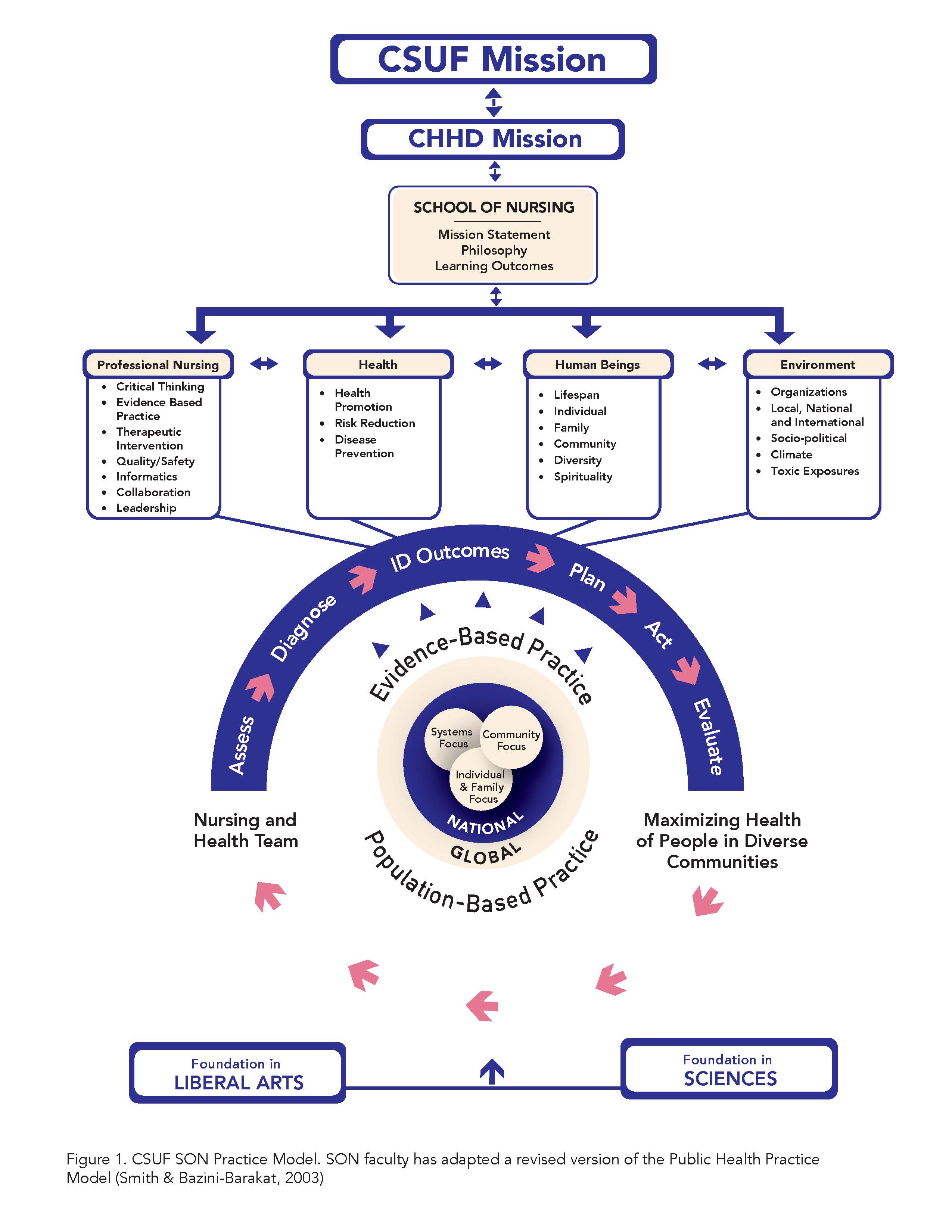Bachelor of Science in Nursing (BSN) SLOs
Ethics:
Engage in ethical reasoning and actions to promote advocacy, collaboration, social justice, and leadership as healthcare professionals.
Professional Nursing:
Demonstrate accountability for self and nursing practice including continuous engagement in life-long learning.
Evidence Based Practice:
Improve patient health outcomes by accessing, analyzing, and interpreting information (theoretical, research, and/or other) at the individual/family and community level.
Critical Thinking:
Use a systematic approach to analyze real or potential problems for the purpose of developing, testing, and evaluating innovative solutions within a variety of healthcare settings.
Communication:
Use communication theories/techniques and demonstrate communication/collaboration with colleagues, transdisciplinary groups, including the use of informatics, to promote relationships with individuals/families and communities.
Manager of Care:
Plan and/or provide patient-centered, empathic, and coordinated care that contributes to safe and high quality outcomes.
Additional End of Program Outcomes
Master of Science in Nursing (MSN) SLOs
Background for Practice from Sciences and Humanities:
Ability to integrate scientific findings from nursing, biopsychosocial fields, genetics, public health, quality improvement, and organizational sciences for continual improvement of nursing care across diverse settings.
Organizational and Systems Leadership:
Ability to apply leadership, organizational, and critical decision-making skills emphasizing ethics, effective working relationships, and a systems-perspective to promote high quality and safe patient care.
Quality Improvement and Safety:
Fluency in methods, tools, performance measures, and standards related to quality, as well as ability to apply quality principles within an organization.
Translating and Integrating Scholarship into Practice:
Ability to apply research findings within practice, resolve practice problems, work as a change agent, and disseminate research results.
Informatics and Healthcare Technologies:
Ability to use patient-care technologies to deliver/enhance care and use communication technologies to integrate and coordinate care.
Health Policy and Advocacy:
Ability to intervene at the system level through policy development and to employ advocacy strategies to influence health and health care.
Interprofessional Collaboration for Improving Patient and Population Health Outcomes:
Ability to communicate, collaborate, and consult with other health professionals, as a member and leader of interprofessional teams, to manage and coordinate care.
Clinical Prevention and Population Health for Improving Health:
Culturally appropriate concepts in planning, delivery, management, and evaluation of evidence-based clinical prevention and population care for individuals, families, and aggregates/identified populations.
Master’s-Level Nursing Practice:
Ability to engage in both direct and indirect care to influence healthcare outcomes for individuals, populations, or systems, based upon an advanced level of understanding of nursing and relevant sciences as well as the ability to integrate this knowledge into practice.
Additional End of Program Outcomes
Doctor of Nursing Practice (DNP) SLOs
Ethics
:
Develop and/or evaluate effective strategies for managing the ethical dilemmas inherent in advanced nursing practice at individual, family, community, and population levels, health care organizations and information systems, and research.
Professional Practice
:
Utilize appropriate theories and evidence from nursing and related fields to provide high quality, accountable healthcare to diverse clients including diagnosis and management in advanced practice, to evaluate outcomes, to develop and evaluate new practice approaches, and to evaluate and improve healthcare delivery systems, practice guidelines and health policy.
Interpret Information for Improved Practice
:
Access, analyze, interpret, and develop information at the individual/family, community/population, and organizational levels to provide high quality health care and health education, initiate change, and improve nursing practice and health care outcomes.
Clinical Scholarship (EBP)
:
Use a systematic approach to identify, analyze, and diagnose actual or potential problems within a variety of health care settings, and develop, evaluate, manage, and test possible solutions based upon the highest level of evidence available, allowing for innovative solutions; demonstrate competence in knowledge application activities: the translation of research in to practice, the evaluation of practice improvement of the reliability of health care practice and outcomes, and participation in collaborative research.
Communication, Collaboration and Dissemination
:
Demonstrate effective oral and written communication, including the use of informatics, with clients, colleagues, and diverse groups to foster effective interprofessional collaboration to promote optimal health outcomes in individuals/families/communities/populations and within healthcare organizations, and to disseminate professional practice findings.
Additional End of Program Outcomes
